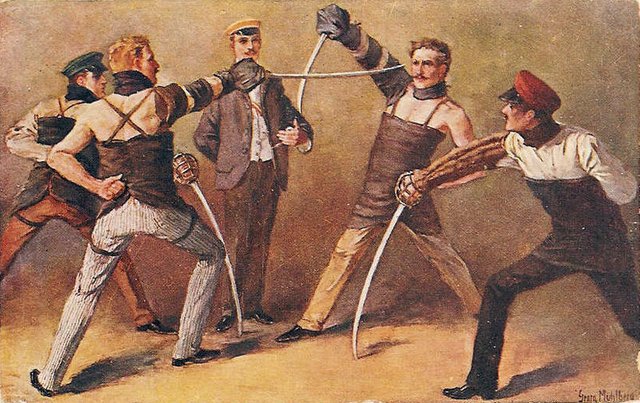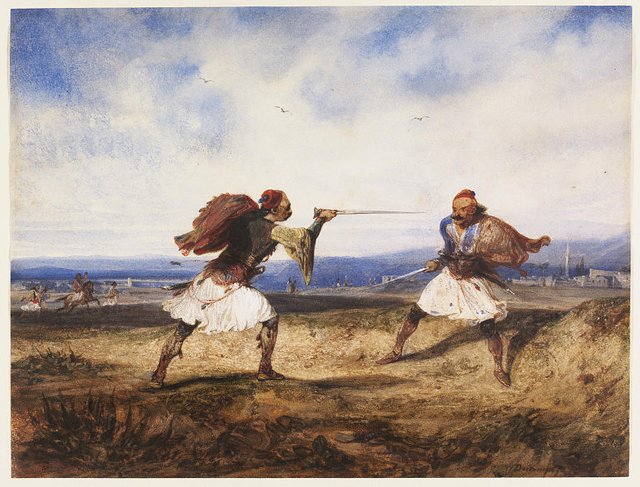Why Must The State Forbid The Duel?
The Duel
Before progressing, let us establish exactly what is and is not meant by the word “duel” for the purpose of this article. A duel is not a drunken fistfight. Nor is it to be confused with a trial by combat, although that would make a delightful subject to explore. As well, a duel, for our purposes here, is not the military clash of champions as in David/Goliath or Achilles/Hector.
We are referring here to the settling of a private dispute between two individuals. Private, meaning that for whatever reason, this dispute is taken to a neutral area and only viewed by individuals selected by the combatants as representatives or “seconds”, attending the needs of and representing the combatants, and/or by those selected as witnesses. This form of duel comes to us in Western Culture from the ancient tradition expressed in the Scandinavian word holmgang, however it was by no means unique to northern Europe. The duel, then, being private combat executed by adults under prearranged circumstances and following agreed terms, for the purpose of permanently settling a private dispute. Duels were often staged on a river island or in a remote field. The seconds would arrange the place, time, style of combat, and conditions for settlement. Weapons, if used, would be available for inspection by the combatants and the seconds prior to the contest. Usually the combatants were the primary parties involved, but under some circumstances one or more of the primaries were represented in combat by a stand-in. Combat would commence upon signal and all combat would cease when an agreed stage had been reached, such as first to lose footing, first to draw blood, first to surrender, or on rare occasions, death. It should be emphasized here that death was rarely the goal of the duel. Upon completion of the duel the original matter of contention was considered settled and could not be appealed or revisited. The rules, conditions, and settlement of the duel were based on the honor of the participants and enforced by voluntary social contract. In other words, if someone cheated or reneged the witnesses were expected to expose the cheater and the community would shun that dishonored person in the manner of their customs. The duel, in its varying local forms, has been the basic method for honorable people to settle their private disputes from prehistory until the adoption of the modern state one hundred to two hundred years ago.
The duel had a variety of advantages in providing justice over other socialized measures. For example, as mentioned, it was private. No unnecessary information needed to be spread around the community and private or possibly embarrassing or perhaps family specific information could remain private. There was no need for police to investigate with their prying questions and intrusive searches. There was no reason to involve a judge or for a jury to hear your private information, and there were no attorneys to drag out facts, ask embarrassing questions, or badger someone into saying something publicly that they preferred to keep private. In addition to privacy concerns, by eliminating the police, investigators, judge, jury, and attorneys you eliminate the monetary cost of justice to the individuals and you eliminate the opportunity for one party to simply buy justice. Also, since this form of justice had no or very little cost it was available to rich or poor without being a burden on uninterested third parties by way of taxation. So then, the duel was an aspect of free market justice rather than socialized justice. Of course, the duel was not the answer for every dispute. As noted above, it had very narrow applications. But within the scope of its limitations, the duel provided a way to address grievances that no socialist based justice system can serve.
Advantages To The Duel
1. Cost
As mentioned above, a private matter settled privately, with the limited cost paid by the interested parties, is vastly cheaper than involving the hordes of tax feeders that come with socialized law.
2. Justice, without regard to individual position in life
The State’s statue representing “Blind Justice” would be a sad joke if not for the State’s devastating effect on the lives of humans. I find it unnecessary to prove that State justice is based almost entirely on the social position of the accused and the social position of the accuser. This is so obvious that I will assume the point need not be labored. The duel, properly executed, is truly blind to social standing, family position, titles of honor, physical hardship, and net worth since the duel itself can be anything from physical combat to a quiet game of chess. An example of this fact was the very first duel recorded on American soil, just one year after the Puritans landed. Two bondservants dueled over a private matter using swords. Both men received minor injuries and the matter was closed.
3. Vengeance and the desire to avenge is deferred to honor
If two parties have a conflict, any solution provided by a third party utilizing force to inflict that solution cannot be satisfactory to both the conflicting parties and will leave at least one party vengeful. Since a satisfactory solution cannot be achieved, the conflict will continue no matter the force applied. If, on the other hand, the two conflicting parties agree on the terms of the duel, to object to the outcome after the duel is to admit dishonesty and therefore dishonor. So honor trumps vengeance in a properly administered duel.
What if I am wrong? What if the duel is less efficient, less equitable, and less successful at providing justice? What if every possible aspect of the duel were to be argued here in this article and the conclusion were clear that the duel fails in every practical way when compared to the socialized justice of the State? What then?
The conclusion I would draw is that the State and its socialized systems are still immoral and any system based on immorality cannot produce justice. Therefore the duel is at least as good as the State even if it fails in its intended purposes.
But the question at hand is, “Why Must The State Forbid The Duel?”
The word “sovereign” comes from the Latin for Super Reign and can literally indicate deistic qualities.
The existence of the duel in society in any form, used to garner justice in a private matter, threatens the sovereignty of the State. The State is a man made god, requiring unblinking faith in the central myth of its necessity to society. The State feigns omniscience, seeks omnipresence and lusts for omnipotence. The State demands that its plans and schemes be secret, but requires its subjects to reveal the most private aspects of their lives to it. If any individual has the right to true privacy then the sovereignty of the State’s right to that information comes into question. If two people can share private information regarding a conflict and settle that conflict entirely in private, the State cannot feign omniscience nor can it claim omnipresence. The duel by its very existence proves that justice can be privately achieved by honor without the boot of the State. Therefore when two people settle a conflict through duel the myth of the sovereignty of the State vanishes.
For this reason, the State could never come to full fruition as long as the duel existed. Many people mark the mid 1600’s as a turning point in the maturity of the State, and I would agree. But among other things, the continuing practice of the duel prevented the State from taking its godly seat as Provider of Justice. In the United States the duel faded from society about the same time Progressive politics, the Temperance Movement and government schools became all the rage. In Japan the duel and the tradition of honor it represented ceased with the Satsuma rebellion in 1877. In Russia, it died with the Tsar and his family. In a final tip of the hat to the duel, the renowned field marshal Günther von Kluge challenged general Heinz Guderian, father of the Blitzkrieg, to a duel. But alas Hitler forbid it.
Ben Stone
2011



The reason the State tried to stop dueling was because it be came another name for murder.
From reading a lot of historical stories, even before the times of the three musketeers a duel was predominantly one sided, a sword master against a hick. The master would cheat, defile a maidens honour, or what ever else he wanted to. The state wouldn't care, they had bigger things to worry about. The hick would challenge the master, this gave the master the choice of weapons, the result was as expected, is this justice?, cheap maybe, but justice?
Then we added technology and got to the time of Billy The Kid. I wonder if the first 21 men who faced him thought it was an equal battle? again, justice?.
while a duel is a 'pissing ' competition [who can piss further] and nobody gets hurt, maybe, but human nature being what it is, there is no such thing as a fair duel. You only enter if you know you are going to win. [besides I drank more beer than you and my bladder is bigger]
The trial system, with equal representation, 12 honest men, is the best we have got, reintroducing dueling is a road to might is right.
Billy the Kid wasn't a duelist, he was a murderer.
In your instance of the weapon master versus the hick, the hick has more chance for justice in a duel than he would in a court owned by the aristocrat.
The purpose of seconds was to ensure as fair a duel as possible.
Is it ideal? Perhaps not.
Is it something to disregard as barbaric? No.
let us look at the word 'Duel' the Concise Oxford Dictionary, the "go to" in English speaking countrys, I don't know whether it is in the USA, states
"Fight with deadly weapons between two persons, in the presence of two seconds, to settle a quarrel."
The seconds were there to make sure nobody fired before the time, only going 9 paces instead of the full 10 for example. They could report on the so called fairness of the murder.
This would tend to take out your example. "the duel itself can be anything from physical combat to a quiet game of chess." I think you were mixing the word competition with duel. Possibly to make your point, but by doing so ruined the whole piece.
In your reply you called 'Billy the Kid' a murderer, but. both men were armed with similar weapons, they had a quarrel. it was an agreement that both men went for their guns at the same time, there were witnesses, they fought a duel. Billy walked away. Might was right.
Was the practice of dueling ever legal in any country? or was it the aristocrats that flaunted the law for their own purpose, and if caught used the 'self defense clause' to escape. Also the quickness and lack of thought that a duel could be called. a swipe at the face of your opposition with an empty glove, and it was all on.
The have nots had to have a larger degree of moderation , no access to weapons, unable to have a 'high manner' or 'Honour' aka Pride. [also no gloves]. therefor history doesn't record them dueling.